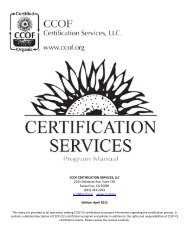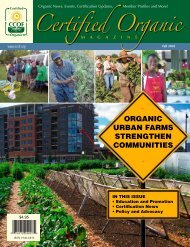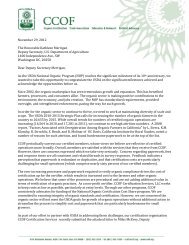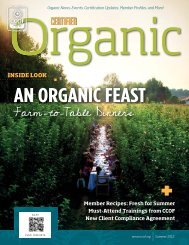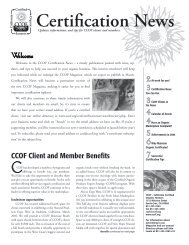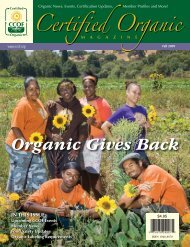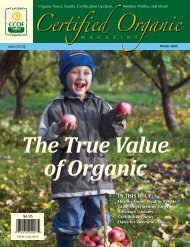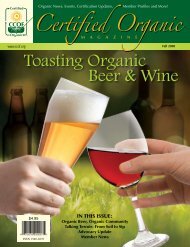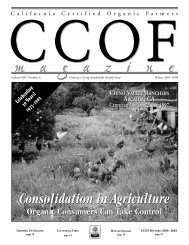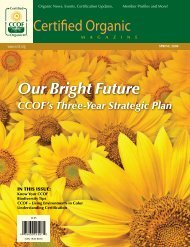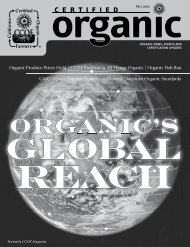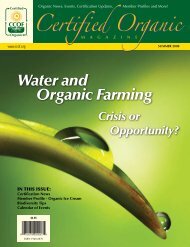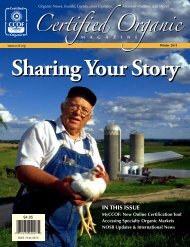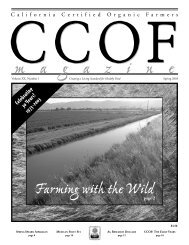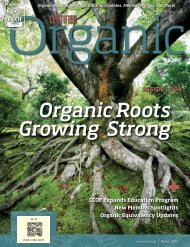Herstory: Women in Organic Agriculture - CCOF
Herstory: Women in Organic Agriculture - CCOF
Herstory: Women in Organic Agriculture - CCOF
Create successful ePaper yourself
Turn your PDF publications into a flip-book with our unique Google optimized e-Paper software.
PROFILES<br />
By Keith L. Proctor, with Laurie Cohen contribut<strong>in</strong>g<br />
Photo by Laurie Cohen<br />
Karen Talbot TALBOT FARMS • PACIFIC SOUTHWEST CHAPTER<br />
IN WHAT WAYS<br />
would you complete<br />
the circle of health<br />
you have and give back<br />
to the earth you love so<br />
much? If you were Karen<br />
Talbot you would start<br />
an organic farm, see few<br />
obstacles <strong>in</strong> your way,<br />
and fashion a small piece<br />
of the earth <strong>in</strong>to your<br />
heal<strong>in</strong>g garden.<br />
Adjacent to a seasonally<br />
dry riverbed, Karen Talbot’s<br />
berry farm is tucked<br />
away deep <strong>in</strong> Pauma Valley<br />
just below where her home looks out over scenic Palomar Mounta<strong>in</strong>.<br />
While its sand and silt content did not offer the perfect place<br />
for ord<strong>in</strong>ary crops to grow, the low pH was no deterrent to her. She<br />
has had two acres of blackberries <strong>in</strong> full production for three years,<br />
and is plann<strong>in</strong>g to add more.<br />
Have there ever been challenges or roadblocks to her newly chosen<br />
career <strong>in</strong> organic farm<strong>in</strong>g? Certa<strong>in</strong>ly. However, belief <strong>in</strong> her Midwestern-bred<br />
values of honesty, hard work and fairness have helped her<br />
succeed <strong>in</strong> a start-up bus<strong>in</strong>ess <strong>in</strong> which she is ever learn<strong>in</strong>g and ever<br />
so enjoy<strong>in</strong>g herself. “<strong>Organic</strong> farm<strong>in</strong>g is a beautiful th<strong>in</strong>g to be part<br />
of,” she says, <strong>in</strong> expla<strong>in</strong><strong>in</strong>g her choice over conventional farm<strong>in</strong>g<br />
methods. “The obstacles I have encountered were bus<strong>in</strong>ess-related<br />
issues <strong>in</strong> the sense that I’ve had much to learn about soil fertility,<br />
market<strong>in</strong>g, and labor management, but more importantly I’d say<br />
they were personal issues like budget and time management.”<br />
Instead of focus<strong>in</strong>g on her lack of experience, she accepted the challenge<br />
of learn<strong>in</strong>g new th<strong>in</strong>gs and develop<strong>in</strong>g her own talents.<br />
Karen enjoys work<strong>in</strong>g through the difficulties produc<strong>in</strong>g a<br />
quickly perishable crop, deal<strong>in</strong>g with busy retailers, and balanc<strong>in</strong>g<br />
her commitment to her family and the needs of her farm. Her<br />
advice to other farmers is to treat others with respect and not to<br />
take th<strong>in</strong>gs personally when the pressure is on. Perhaps this is why<br />
she often sees tremendous support for her venture as a woman<br />
farmer. What she often hears from others is a mix of, “You go girl!”<br />
and “How can I help?”<br />
“Life is good,” she expressively states, and she adds, “I’ve got a<br />
lot to learn.”<br />
Mary Eldredge VACA VALLEY ORCHARD COMPANY • YOLO CHAPTER<br />
LIVING ON AND FARMING THE LAND THAT HER<br />
grandparents farmed 80 years ago, Mary Eldredge of<br />
Vaca Valley Orchard Company doesn’t believe <strong>in</strong> the<br />
modern agriculture mach<strong>in</strong>e that is destructive to the<br />
environment. In this belief, she jo<strong>in</strong>ed <strong>CCOF</strong>.<br />
After her father passed away, her mother leased the land, but never<br />
considered sell<strong>in</strong>g it. When Mary took over <strong>in</strong> 1988, she decided to<br />
move to part-time work and run the orchard. Mary has ga<strong>in</strong>ed much<br />
experience and knowledge about organic orchards s<strong>in</strong>ce tak<strong>in</strong>g over the<br />
family land. She states that there are many challenges to work<strong>in</strong>g the<br />
orchard, namely reach<strong>in</strong>g and ma<strong>in</strong>ta<strong>in</strong><strong>in</strong>g the right amount of nitrogen<br />
<strong>in</strong> the soil, and fight<strong>in</strong>g off the coddl<strong>in</strong>g moth and walnut husk fly.<br />
She was told that it would take about ten years before her land<br />
would function well as organic, and now she can see it happen<strong>in</strong>g.<br />
She sees that she is shar<strong>in</strong>g the bounty with other forms of life,<br />
and can see the beneficial <strong>in</strong>sects controll<strong>in</strong>g the pests. Where<br />
others see an unkempt orchard floor, Mary sees life; quail and<br />
doves liv<strong>in</strong>g <strong>in</strong> brush piles <strong>in</strong> her orchard. When she looks at conventional<br />
orchards, she sees a desert on the orchard floor.<br />
When Mary started, she had all tree fruit. She has s<strong>in</strong>ce<br />
dropped much of her prune acreage, replaced some of it with<br />
Page 6<br />
wildlife habitat, and added vegetables and figs. While she cont<strong>in</strong>ues<br />
to wholesale tree fruit, she has also opened up a fruit stand.<br />
When it comes to challenges as a woman, she has found many.<br />
She notes that sometimes as a woman at conventions and workshops,<br />
some people are quick to dismiss her, but then are surprised<br />
to f<strong>in</strong>d she is a farmer, and sometimes a competitor. She lets it roll<br />
off, but notes that women aren’t always taken seriously as farmers.<br />
“Farm<strong>in</strong>g is a very male-dom<strong>in</strong>ated occupation, and maybe for<br />
good reason; farm<strong>in</strong>g is very hard work physically. The traditional<br />
farm<strong>in</strong>g community resents women not stay<strong>in</strong>g <strong>in</strong> their place,”<br />
says Mary. “Men don’t often want to listen to my ideas.” But, as<br />
long as she pays her bills and delivers a good product, she po<strong>in</strong>ts<br />
out, she can have a bus<strong>in</strong>ess relationship with most anyone.<br />
Mary has a partner <strong>in</strong> her orchard, Aliki Poulou, whom she<br />
brought on <strong>in</strong> 1990. Mary organizes the operation, makes decisions<br />
on fertility, pest management, water<strong>in</strong>g programs, and market<strong>in</strong>g.<br />
She relies on her farm stand employees to communicate how much<br />
of a particular crop to plant, based on sales at the farm stand. Her<br />
employees have sometimes questioned her decision to go organic,<br />
but she is conv<strong>in</strong>ced that it is the right way to farm.<br />
The Newsletter of <strong>CCOF</strong>



